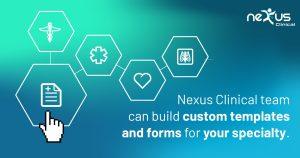In today’s fast-paced healthcare landscape, cardiology practices are constantly seeking ways to enhance efficiency and improve patient care. The adoption of Cardiology EHR (Electronic Health Records) systems like Nexus Clinical has revolutionized the way cardiology practices manage patient information, streamline administrative tasks, and deliver high-quality care. This article explores how Cardiology EHR Software can significantly enhance cardiology practice efficiency, ensuring seamless integration and improved patient outcomes.
Streamlining Cardiology Chief Complaints and Exams
Nexus Cardiology EHR simplifies the process of recording and tracking chief complaints and examinations. This technology allows cardiology professionals to effortlessly capture patient data, including medical histories, symptoms, and vital signs. Cardiology-specific templates assist in easy and thorough documentation, ensuring that no critical information is overlooked.
Comprehensive Cardiology Forms

Nexus Clinical EHR offers an array of cardiology-specific forms, such as Echocardiogram, Pharmacological Nuclear Stress Study, Exercise Nuclear Stress Study, and more. These forms are tailored to meet the unique needs of cardiology practices, facilitating precise data collection, interpretation, and seamless communication between healthcare providers.
Patient Intake and Scheduling Made Easy
Efficient patient intake and scheduling are vital for cardiology practices. Cardiology EHR simplifies appointment management, ensuring optimal patient flow. Through integrated scheduling tools, receptionists can efficiently book appointments, reschedule, and manage waitlists. Patients can also complete electronic intake forms before their visit, saving valuable time and reducing errors.

Electronic Record Keeping
The transition from paper-based records to electronic records has brought a multitude of benefits to cardiology practices. Cardiology EHR ensures data accuracy, security, and accessibility. Providers can quickly retrieve patient records, reducing the risk of misplacing or losing critical information.
Seamless Insurance Billing via a Clearinghouse
Accurate and timely insurance billing is crucial for the financial health of cardiology practices. Nexus EHR offers a seamless integration with clearinghouses, automating the billing process. This reduces billing errors, speeds up reimbursements, and optimizes revenue cycles.
Efficient Charting with Templates
Cardiology EHR software includes customizable templates for charting, simplifying data entry and report generation. These templates help streamline clinical workflows, ensuring consistent documentation and reducing the time spent on repetitive tasks.
Compatibility with All Types of Devices
Nexus Cardiology EHR software is designed to be compatible with various devices, including desktop computers, laptops, tablets, and smartphones. This compatibility allows healthcare providers to access patient records and clinical information from anywhere, enhancing the flexibility and efficiency of patient care.
Document Management and eFax
Efficient document management is essential for cardiology practices. Cardiology EHR systems offer a secure and organized way to manage patient records, reports, and other documents. The integration of eFax enables easy, paperless communication with other healthcare providers, ensuring a seamless exchange of critical information.
Appointment Reminders
Nexus Cardiology EHR features automated appointment reminder systems. These reminders, delivered via SMS and emails help reduce no-shows and enhance patient engagement. Patients appreciate the convenience of receiving timely reminders for their cardiology appointments.
Integrated Labs for Ordering and Receiving Results Electronically
Efficient cardiology practices benefit from integrated labs within the EHR system. Providers can electronically order necessary tests and receive results promptly. This feature reduces turnaround times and ensures timely interventions, ultimately improving patient outcomes.
E-Prescribing and Sending Prescriptions to the Pharmacies
E-prescribing is a time-saving and error-reducing feature of Nexus Cardiology EHR. Healthcare providers can prescribe medications electronically, ensuring legibility and accuracy. Prescriptions are securely sent to the patient’s preferred pharmacy, enhancing patient convenience.
Patient Engagement and Communications
Effective patient engagement is essential for successful cardiology practices. Nexus Clinical facilitates secure communication between patients and their healthcare providers through secure patient portals. Patients can view their records, ask questions, and receive educational materials, promoting a collaborative approach to care.
Streamlining Patient Payments
Managing patient payments can be a complex task for cardiology practices. Cardiology EHRs often include tools for invoicing and processing payments securely. This simplifies the financial aspect of healthcare delivery, improving the overall patient experience.
Cardiac Procedures and Reports
Nexus Clinical EHR is designed to accommodate various cardiology procedures and generate comprehensive reports, including:
- Echocardiogram
- Pharmacological Nuclear Stress Study
- Exercise Nuclear Stress Study
- Endovenous Radiofrequency Therapy Treatment Form
- Lower Extremity Venous Duplex Final Report
- Cardiac Catheterization
- Left Heart Catheterization and Coronary Angioplasty
- Plano Balloon Angioplasty
- Post Vein Ablation Lower Extremity Venous Duplex Final Report
These specialized reports are crucial for tracking patient progress and ensuring seamless communication between cardiology providers.
DICOM/PACS Integration
Cardiology EHRs often offer seamless integration with DICOM (Digital Imaging and Communications in Medicine) and PACS (Picture Archiving and Communication System). This allows cardiology practices to efficiently manage and access medical images, enhancing diagnostic capabilities and treatment planning.
Automated PDMP (Prescription Drug Monitoring Program)
With the growing importance of prescription drug monitoring and opioid crisis prevention, Cardiology EHRs integrate automated PDMP features. This ensures that healthcare providers have access to patients’ prescription histories, enabling informed decisions and promoting patient safety.
In conclusion, Cardiology EHR systems like Nexus Clinical are powerful tools that enhance the efficiency of cardiology practices. They offer specialized features for streamlining administrative tasks, improving patient engagement, and ensuring accurate documentation. With the ability to handle cardiology-specific procedures, these systems play a pivotal role in delivering high-quality care. As the healthcare landscape continues to evolve, the integration of Cardiology EHRs is becoming increasingly indispensable for modern cardiology practices, setting them on a path toward greater efficiency and improved patient outcomes.





